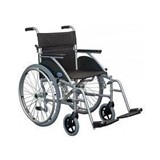CHI has been working in collaboration with the Asthma Foundation of NSW to conduct a large-scale postal survey of 4,131 older adults living in New South Wales. It shows that the majority of respondents thought that it was unlikely that they would get asthma, despite the fact that about one in 10 people in the population actually have asthma
CHI’s Director, Professor Sandra Jones said that "while asthma is often seen as a childhood illness, many older adults are diagnosed with asthma for the first time".
Older adults answering the survey also showed poor knowledge of asthma symptoms, with many not recognising "shortness of breath", "tightness in the chest", and "cough at night" as signs of asthma.
Uwana Evers, a PhD candidate with CHI said that "a lack of awareness of asthma symptoms and the idea that breathlessness is a normal part of ageing means that older adults often don’t raise concerns about their breathing with their GP".
While the majority of people recognised that asthma is a serious condition, people were less informed about how to manage asthma, with over a third indicating that the disease can be successfully controlled without medication.
"While asthma can’t yet be cured, it can, in most cases, be successfully managed through the use of appropriate reliever and preventer medications," according to Pippa Burns, a PhD candidate with CHI who is investigating the feasibility of an online self-management aide for older adults with asthma.
The focus of the recent National Asthma Week (1-7 September) was: ‘you can help someone with asthma’.
"Our message is that the community needs to be aware of asthma in the elderly," Professor Jones said.
"This includes being sensitive to the signs and symptoms of asthma and knowing what to do in an asthma emergency."
"We’re also suggesting that older adults with asthma visit their GP, at least once a year for an ‘asthma review’. This helps to ensure that they have the best asthma control possible."
For more information about asthma contact the Asthma Foundation of NSW on 1800 645 130.
For more information about the research contact Professor Sandra Jones on: email: sandraj@uow.edu.au


